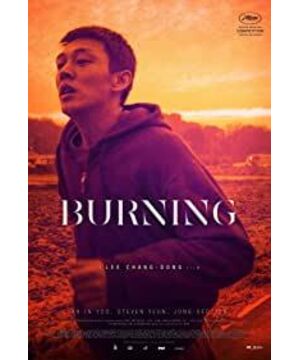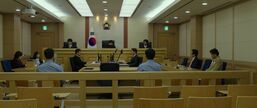To start with a quote from an interview with Li Cangdong:
"I think the world is really a mystery these days to young people who are helpless and angry."
This is also the most intuitive feeling brought to us by Li Cangdong's latest work "Burning". The surging energy brought by the backlog to the end turned helplessness and anger into tragedy.
Li Cangdong's directing style is close to that of a poet, and the visualization of the inner collision of marginal characters in his works always immerses the audience in the experience.
If you have seen Li Cangdong's previous works "Poem", "Miryang", "Oasis", "Mint", etc., you can feel the protagonist's struggle against the fog of reality.
Haruki Murakami is a must-have manual for literary youth. The central perspective of the people and events in the author's writings is still the cry of the marginalized to the world.
Li Cangdong's "Burning" was inspired by Haruki Murakami's "Burning the Barn", and was also influenced by the American writer William Faulkner's "Burning the Horse Barn".
Haruki Murakami's "Burning the Barn" is extremely short, with only more than 8,000 words, and there is a lot of blank space, just like a poem that can be continuously interpreted and reconstructed.
"Burning" adds a lot of rich interpretations to "Burning the Barn", which makes the characters in the film fuller.
But Li Cangdong accurately grasped the bone marrow of "Burning the Barn". Although the story of "Burning" is more abundant and delicate, it still retains a labyrinth-like exploration of the human heart, so that the film deliberately makes the audience lose in the plot, and finally faces only tragedy.
For a movie like "Burning", everyone can interpret it differently, but it is not limited to who is right and who is wrong. This is the subtlety of the movie.
Therefore, according to his own interpretation, Da Cong has "Burning" in his heart (if you don't like it, don't spray it).
——Spoiler analysis line——
Themes and satires in the film
The characters in the film are all marginalized people. Even rich ben is still marginalized in society. The three of them don't care about the values of mainstream society or talk about current events and weather. They are all carefully managing their inner hunger.
Hai Mei raised an issue in the film, "little hungry" and "great hungry".
Small hunger is to solve food and clothing, food, housing and transportation, while big hunger needs to solve the emptiness of the heart and achieve peace of mind in one's own way.
Hae-mi thinks her heart is full of hunger, so she learns pantomime and goes to faraway Africa to find herself.
But the irony is that in real life, Hae Mi is the kind of person who urgently needs to solve the little hunger in front of her.
Haimei herself was doing a street job with very little income, and she owed a lot of credit card debt, causing her family to leave her.
It stands to reason that Hai Mei should not expect to be uneasy in her heart, but to solve more practical problems of food, clothing, housing and transportation.
Therefore, Hai Mei, whose reality and mental state are extremely inconsistent, is extremely incompatible when Ben takes Hai Mei to a cocktail party to chat.
Those so-called listeners all had disdain and ridicule towards Hae-mi on their faces. Although it was subtle, it was enough to prove that in their eyes, Hae-mi was just a moaning madman.
In their eyes, they knew very well that Hae-mi was just Ben's Nth plaything, and Ben would only look for someone who didn't exist in society as his foil to fill Ben's big hunger.
Ben's hunger seems more logical to everyone. Ben is Gatsby from South Korea. He has a mysterious background and a wealthy family. He drives a sports car to find his inner oasis. It seems that this type of person is more qualified to talk about the big hunger. , the pursuit of bass in the spiritual realm.
This is also a metaphor in the film and a question to the audience. Why should only those who have completed the small hunger be qualified to explore the inner hunger? !
And Zhong Xiu's character and heart are also full of this irony, and it is a more intense collision between small hunger and big hunger.
Zhong Xiu studied literature and had a dream of becoming a novelist, but the reality was that his class and identity made him struggling on the edge of little hunger.
Zhong Xiu's father's lawsuit, a piece of chicken feathers in the family, he is unemployed and struggling to find a job, and raises a cow who is as lonely and slaughtered as himself.
And ironically, before Hae Mi appeared, Zhong Xiu's spiritual world was a labyrinth that he didn't want to explore.
It stands to reason that a person who wants to become a writer should be filled with all kinds of great hunger in his inner world, convert his inner hunger into words, and announce the world.
But Zhong Xiu said he wanted to write a novel, but he didn't start writing it for a long time. His lazy personality made him have no courage to take the step of pursuing the spiritual world.
Zhong Xiu's usual behavior and state are also out of place in the comparison between Hai Mei and Ben.
For example, Zhong Xiu's uneasiness and silence at the reception, and her idleness on the dance floor all reflect Zhong Xiu's inferiority complex.
In the bullpen, Zhong Xiu laughed at herself and found a kind of spiritual relief, using the sentence: Loneliness is a person's carnival, and carnival is a person's loneliness can best be interpreted.
In fact, the core of "Burning" is to explain how Zhong Xiu finds the theme of the great hunger in his heart. The appearance of Hai Mei allows Zhong Xiu in the labyrinth to gradually find an exit. This exit is Zhong Xiu's Hai Mei's love.
So in the end, Zhongxiu used his own method to release his love for Haimei, which is to kill Ben in anger.
At the end of the film, Zhong Xiu's nakedness echoes the half-nudity of Hai Mei in the setting sun, creating a wonderful connection between the two of them. own great hunger.
metaphor
There are many metaphors in the film, and there is a lot of space for white space and idle writing, so that each audience can fill in the interpretation they want after watching it.
peel the orange
Peeling an orange is a pantomime. The mystery of the film is like peeling an orange. The more you look back, the clearer it becomes, and the truth is revealed layer by layer.
But in the end, everything is pantomime, can't be seen, can't be touched.
In the pantomime peeling summary, you seem to see oranges and even taste oranges in the process of peeling the oranges, but all is empty.
masturbation
Before Zhong Xiu and Hai Mei kissed, Hai Mei said that the sun would shine through the Nanshan Pagoda, which was very short-lived.
So when they kissed, Zhong Xiu saw that brief "sunshine" hitting the wall.
Many people think this paragraph is very strange. Da Cong thinks that when a person is alone for a long time, in order to vent his lust and masturbation, he will start an alarm clock illusion somewhere.
Because Zhong Xiu is at home for a long time, watching a certain place to masturbate, when he really kisses Hai Mei, it will also cause distraction, and Zhong Xiu's personality is easy to be distracted, the whole film Zhong Xiu gives people Such a feeling.
In addition, Zhongxiu is masturbating to the Namsan Tower, a landmark building in Seoul, which also shows that Zhongxiu, the representative of the lower class, is disappointed and vented towards the country of South Korea, and even deliberately blasphemed.
Zhongxiu's father
The story line of Zhong Xiu's father was influenced by William Faulkner's "Burning the Horse Shed". In "Burning", Zhong Xiu's father was brought to court for some trivial neighborly matters.
The disappearance of Hae-mi in the film is compared with the case of Jong-soo's father's dispute, which satirizes the Korean government's indifference to a case that really needs attention, but it takes a lot of trouble to adjudicate a neighborhood dispute.
When Zhong Xiu was away from his father, Zhong Xiu opened one of his father's warranty cabinets, which contained all kinds of exquisite knives, which may be a symbol of his father's "big hunger".
plastic shed
This should be understood by many people. In Ben's eyes, plastic sheds are dispensable. The plastic sheds he calls burned may be women, those women who are on the edge.
Even if those women disappeared in this world, it was like burning a plastic shed, and eventually turned into a puff of smoke, and no one cared about it in the end.
film mystery
The focus of the film's perspective is on Zhong Xiu, so the audience knows as much about the plot as Zhong Xiu. This also created a disguised Rashomon.
The brainy Da Cong still found a clue from it, and went to show everyone the scene of the "perfect crime".
First of all, Da Cong believes that Hae-mi is dead. The first is that Ben said that Zhongxiu is someone who trusts her. If Hae-mei is in danger or to avoid debts, she will not go to Zhongxiu.
Then, when Zhong Xiu was looking for the plastic shed, she received a call from Hai Mei. There was no sound on the phone, only the sound of rushing running. Then there was a strong and loud voice approaching the phone, and then there was the sound of the phone being robbed, and then never again. Can't contact Shanghai Mei.
This can be concluded that Hae-mi tried to find Zhongxiu, which also shows that Hae-mi's disappearance is likely to be dead.
So under the assumption that Hae Mi is dead, there are two possibilities.
Let's first analyze the plot of Ben killing Haimei:
In the most difficult homicide cases to detect, the murderer is the murderer without a motive. Ben belongs to this category. Ben killed Hai Mei because he wanted to satisfy the "big hunger" in his heart.
Ben regards the women she touches as plastic sheds, dispensable, and exists like garbage, he compares himself to a flood, who will be washed away, and will not be guilty.
In the conversation between Ben and Zhongxiu, Ben himself revealed that he burned the plastic shed, but he was actually burning women.
Ben also said that he recently took a fancy to a plastic shed. It was nearby, but it was actually Haimei. At this time, Haimei was indeed nearby. Ben didn't lie.
So when Zhongxiu was looking to see if the nearby plastic shed was burned, the direction was wrong, because Ben was not burning the plastic shed at all, but burned Hae Mei in an unknown place.
When Zhong Xiu was chasing Ben, of course Zhong Xiu knew, but maybe he was also enjoying this kind of pursuit to give himself a kind of superiority.
There are some perverted killers who just want to share the process of killing themselves with others, and perhaps Ben is also enjoying the process of others tracking him down.
When Ben went to a reservoir, it seemed that the reservoir was Ben's next location for burning plastic sheds. He didn't worry about Zhong Xiu's tracking, because in Ben's eyes, Zhong Xiu was actually a plastic shed. No loser role.
Just like when Zhong Xiu told Ben that he loved Hae Mei, Ben laughed, full of sarcasm, because in Ben's eyes, people like Zhong Xiu were not worthy to talk about love, literature, and even less likely to be a novelist.
Ben asked Zhong Xiu over and over what kind of novel he wanted to write and how the novel was going, but Zhong Xiu never started writing. This was actually Ben's sarcasm. Ben just wanted to sit in a plastic shed that did nothing.
So Ben also believed that even if Zhong Xiu followed him, he couldn't find any clues, and it was impossible to attack him.
As for Zhong Xiu, observing Ben from his own perspective, although it is speculated from the logic of the investigation, these are not evidence, but the orientation is still obvious.
The first is the cat named boli, and Zhongxiu reacts when he calls it.
Hae-mi's room has been tidied up, and this spotless, neatly folded style is similar to the towel folded when Jong-soo opens Ben's toilet.
Ben's yawning side shows that he is not very interested in Haimei and the topics of girls who sell goods in duty-free shops. Ben's targets are all women with such a low sense of social presence, which is fixed with him. The circle of friends is very inconsistent.
Looking at the jewelry in Ben's toilet, it can be seen that these jewelry are cheap, as many as 15+ pieces, which seems to indicate that in Ben's hands, more than ten girls have "disappeared".
Ben's makeup on the girl who sells goods in the duty-free shop is like Ben doing a ceremony, not treating the girl as a love object at all, but more like Ben sculpting his own works. Maybe this girl who sells goods in the duty-free shop is the next one. Target.
Therefore, all the directionality is actually not good for Ben.
Hae Mi was not killed by Ben
Of course, every "evidence" mentioned above against Ben can be refuted in the film, which is what the film is worth exploring.
If Hae Mi didn't kill Ben, it's more likely that the creditor killed it.
Then the story of the creditor killing Haimei goes like this:
Zhong Xiu said that Hai Mei was a prostitute, and Hai Mei would not contact Zhong Xiu after the fallout.
During the period, Haimei was charged by the creditor, and she might be covered with something during the period. Although she tried to escape halfway and called Zhong Xiu, she was caught by the creditor halfway through, and she could not contact Zhong Xiu again.
Then Haimei was brought back to her own home by the creditor. The creditor wanted to find anything of value from Haimei's home, but it backfired, so she killed her at home.
In order not to leave any evidence, the creditor cleaned up the room and took away the cat-related items.
In a word, Hai Mei has always been a mystery for Zhong Xiu, so Zhong Xiu used her own judgment perspective (the first assumption) and decided that Ben was responsible for Hai Mei disappearing, so Zhong Xiu used her own way to make off.
Is Hae-mi dead? If Hae-mi dies, is it Ben's fault?
The expression of Li Cangdong's implication in the film is already obvious. This is an open ending. No matter what angle the conclusion is drawn from, it only accounts for a 50% possibility. Any assumption will be destroyed by a possibility.
Li Cangdong wants to use such a misty plot trend to let the audience focus on the transformation, anger, and burning of the characters, so as to understand the real transformation of Zhong Xiu in the tragic ending.
Pay attention to the public account of "Da Cong Watching Movies", do not pursue the running volume, only grind the fine products
View more about Burning reviews










